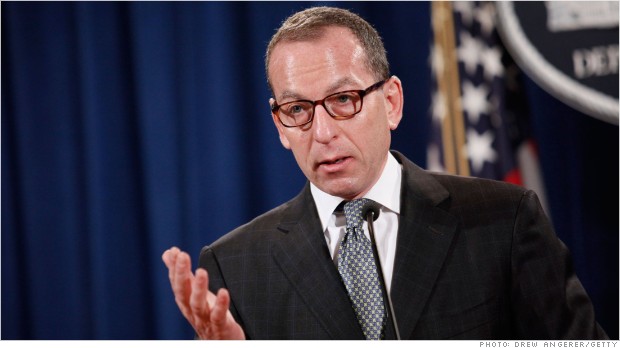
Lanny Breuer, former head of the Justice Department's criminal division, said in 2009 that high-level crisis cases "will be brought."
NEW YORK (CNNMoney) It's been five years since the collapse of Lehman Brothers and the peak of the financial crisis, but the wait for criminal cases against bankers continues.The financial sector hasn't evaded criminal charges entirely in the past five years -- a pair of former UBS (UBS) traders have been indicted over the Libor rate-fixing scandal, for example, and one-time employees from JPMorgan (JPM, Fortune 500), Bank of America and elsewhere have pleaded guilty to bid-rigging in the municipal-bond market.
Dozens of Wall Street professionals have also been charged as part of the Justice Department's ongoing crackdown on insider trading.
But when it comes to the activity on Wall Street that most directly contributed to the crisis -- the creation and sale of mortgage-backed securities that eventually failed in droves -- criminal cases against individuals have been notably absent.
"It's a gross miscarriage of justice," said Dennis Kelleher, president of the financial reform group Better Markets. "How can you have the biggest crash since 1929, causing the worst economy since the Great Depression, and not a single person at a major, politically connected, too-big-to-fail Wall Street bank is held accountable?"
Prosecutors have filed a number of civil lawsuits against financial institutions over mortgage-related securities, including Bank of America (BAC, Fortune 500), Goldman Sachs (FADXX) and Citigroup (C, Fortune 500).
"Clearly the government believes they have some kind of case, because they've secured hundreds of millions of dollars in settlements, but clearly they don't believe they have the evidence to charge people in the executive suites," said Michael Weinstein, a white-collar defense lawyer and former federal prosecutor.
SNL Financial estimated last month that overall, big banks have paid $66 billion in litigation costs in the past three-and-a-half years.
Weinstein said the higher bar for criminal cases, in which prosecutors must prove intent, has likely been a stumbling block for the Justice Department.
Things haven't been much better on the civil side.
In 2010, the Securities and Exchange Commission reached a $67.5 million settlement with Countrywide co-founder Angelo Mozilo, who had been accused of defrauding investors by hiding the growing risks of the company's mortgages. But Mozilo escaped criminal charges, and settled the SEC case without admitting or denying wrongdoing.
In August, the SEC scored a v! ictory in the trial of former Goldman Sachs vice president Fabrice Tourre, who was found liable for misleading investors in mortgage-related securities. But Tourre, too, escaped criminal charges. He was not even 30 when the crisis hit, and critics dismissed the case as the scapegoating of a low-level employee.
The SEC did not immediately respond to a request for comment.
The Justice Department started its post-crisis investigations with confidence. Questioned at a 2009 Senate hearing about why there hadn't yet been any high-level prosecutions, then-Assistant Attorney General Lanny Breuer responded that such cases were "being pursued and investigated."
"The folks who perpetrated a lot of these crimes, to the degree they were crimes, took a long time in hatching and developing [them], and bringing the cases will take a long time, but they will be brought," Breuer said.
In 2011, the government's Financial Crisis Inquiry Commission said that lenders "made loans that they knew borrowers could not afford and that could cause massive losses to investors in mortgage securities," and that banks sold such securities to investors without disclosing their true quality.
Even back in 2006, the Mortgage Brokers Association for Responsible Lending was warning that 37% of all U.S. loans were "stated income" loans, popularly known as "liars' loans" because they do not require borrowers to verify their income.
"Greed by mortgage brokers, banks, and real estate developers must not be encouraged by keeping this issue unaddressed," MBARL president Steven Krystofiak said at the time.
Although there are a number of charges with long statutes of limitations that prosecutors could still use in future indictments, experts said the chances of such cases become more remote as time goes on.
DOJ spokesman Peter Carr said that prosecutors "follow the evidence where it leads," and that "no individual or institution is immune from prosecution."
"T! he depart! ment has aggressively prosecuted a range of complex and sophisticated financial fraud cases, and a number of major investigations are still ongoing," Carr said.
The DOJ has filed charges against nearly 3,000 defendants in mortgage fraud-cases over the past three fiscal years, though those have largely targeted borrowers and "Main Street" scam artists.
"They're simply prioritizing the 'Dick and Mary' cases," said Bill Black, a law professor at the University of Missouri-Kansas City and a former banking regulator. "They only looked at the small cases and so they only reported the equivalent of white-collar street crime."
Perhaps attempting to rectify this situation, the Justice Department announced a joint state and federal task force in January of last year focused specifically on investigations related to mortgage-backed securities. The creation and sale of faulty mortgage securities, Attorney General Eric Holder wrote in a memo, "contributed significantly to the collapse of the housing market, damaged the public's trust and threatened the safety and soundness of our economy."
But all these months later, critics are still waiting for the task force to mount cases against individuals.
"As in any case, the passage of time makes it more difficult, but what's really needed is the prosecutorial chops and the political will to do it," Kelleher said. ![]()
No comments:
Post a Comment